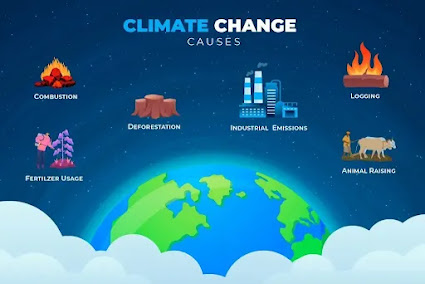Climate change is primarily driven by human activities that release greenhouse gases into the atmosphere. These gases trap heat from the sun and cause the Earth's average temperature to rise, a phenomenon known as global warming. While there are natural factors that can influence the climate, the current rapid warming of the planet is largely attributed to human actions. Here are the main human-induced causes of climate change:
Climate Change causes of Global warming And Major Problem
- Burning Fossil Fuels: The combustion of fossil fuels such as coal, oil, and natural gas for energy production, transportation, and industrial processes is the largest contributor to greenhouse gas emissions. This releases carbon dioxide (CO2) and other pollutants into the atmosphere.
Deforestation: Cutting down forests reduces the planet's ability to absorb CO2. Trees and vegetation act as carbon sinks, and when they are removed, the carbon stored in them is released into the atmosphere. Industrial Processes: Various industrial activities release greenhouse gases such as methane (CH4) and nitrous oxide (N2O) into the atmosphere. These gases come from processes like cement production, chemical manufacturing, and agriculture.
Agriculture: Agricultural practices contribute to climate change through methane emissions from livestock digestion and rice cultivation, as well as nitrous oxide emissions from fertilizer use. Land Use Changes: Converting land for urban development, agriculture, and infrastructure can release stored carbon and alter natural ecosystems, impacting the carbon cycle. Waste Management: Landfills and waste management practices can generate methane emissions as organic waste decomposes anaerobically. Transportation: The use of gasoline and diesel fuels in vehicles is a major source of CO2 emissions. The transportation sector also emits other pollutants that contribute to climate change. Industrial Agriculture: Large-scale agriculture practices, including the use of synthetic fertilizers and monoculture farming, can lead to increased emissions of nitrous oxide and deforestation. Use of Synthetic Chemicals: Some industrial processes and the use of certain synthetic chemicals can release potent greenhouse gases. Land and Water Management: Alterations to land surfaces, such as draining wetlands and changes in water management, can lead to increased emissions of methane. Wastewater Treatment: Wastewater treatment facilities can release methane and nitrous oxide during the treatment process. Permafrost Thaw: As global temperatures rise, permafrost in Arctic regions begins to thaw, releasing large amounts of methane, a potent greenhouse gas. While these human-induced causes are the primary drivers of contemporary climate change, natural factors like volcanic eruptions, changes in solar radiation, and natural variations in greenhouse gas concentrations also influence climate to some extent. However, the current rate and extent of global warming far exceed what can be attributed to natural factors alone, underscoring the urgency of addressing human-induced causes of climate change.






0 Comments